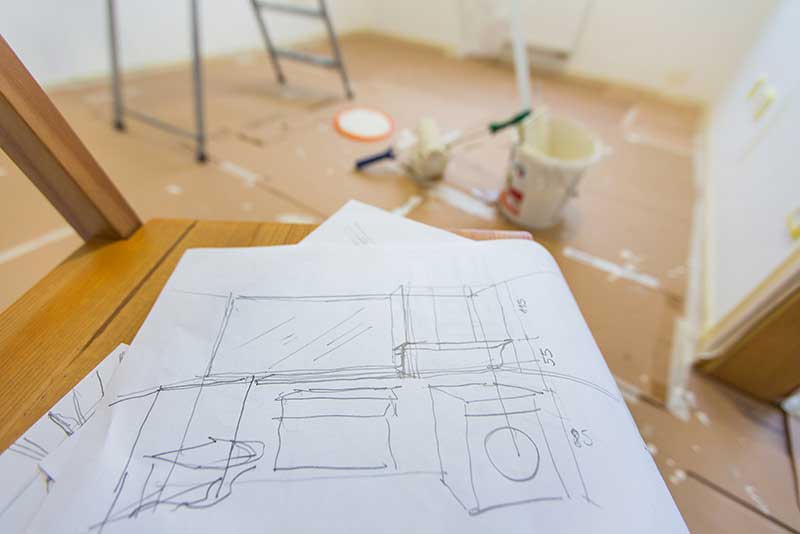
1. Don’t make your decisions after you begin.
It is often tempting to just get started. However, if you want your renovation to go smoothly, the best approach is to make every single decision before work starts. Of course, there will be situations that crop up and cause delays – and a good builder can talk you through the more common ones beforehand – but these don’t tend to cause the biggest problems.
Most delays (and problems) are caused by making decisions ‘on the hoof’; about issues like paint, trim and tap selection. These may seem small details, but when your tap is two weeks late and the plumbers have to be rescheduled (and when the medicine cabinet door hits the tap when it’s finally installed) it becomes clear how something small can balloon into a week’s delay on a five-week project.
2. Don’t put lipstick on a pig.
Put bluntly, some houses should be knocked down rather than fixed up. It is not unknown for people to focus on form rather than function and put money into expensive cabinets for a house with a sagging floor, or into high-efficiency heating in a house with no insulation. Listen to the professionals who come to look at your job. Be open to their suggestions.
3. Don’t buy your own materials.
It may seem like an obvious way to save money. After all, you know that a builder is going to mark up the cost of materials and pass that added cost on to you? However, the builder will get a better original price than you, meaning that even after the mark-up, you won’t be paying any more.
4. Don’t be a distraction.
Once work has started, keep out of the way. At the risk of sounding harsh, every minute you spend talking to the plumber or the electrician is a minute they are not working on your house. If the conversation is important and will have an impact on the job then fair enough. But if not, bear in mind that plumber or electrician is still charging for their time while you talk about your vacation plans.
5. Don’t let kids and pets get in the way.
Similarly, keep children and pets clear of the project. Of course, the people working in your home will often try to accommodate your family, but they are a distraction that cause delays. Besides, it’s simply not safe to have children or animals around construction.
6. Don’t live in the home.
In fact, the best option for a smooth project is for you and your family not to be there at all. Of course, renovation can be expensive and moving out just adds to the cost, but the work will experience fewer delays if you are offsite. If you can’t move out for the whole job, try to schedule at least some time away or set up a clean, comfortable place to retreat to when you can’t handle coming home to a messy and stressful construction site.
7. Don’t change your mind (too much).
It is inevitable that you will change your mind about something on your project. However, know this: every time you change your mind, that’s a variation to the brief and variations cost money. The change may seem minor but there is always an added cost — even if it is only the time spent discussing the change. Everyone makes changes, and that’s OK; however, be aware of the potential to disrupt and delay the job.
8. Don’t work without a contingency fund.
If your project ends up costing you more than you expected or budgeted, you’re in good company. That’s why you have a contingency fund, a pot of money that is available for the unexpected but is not included in the original budget. Whatever you do, don’t be tempted to put all your money into the project budget in order to afford a more elaborate design. It is guaranteed that at some point you’ll need your contingency fund. If you follow rule number one and make every decision ahead of time, you can probably get away with a 5 per cent contingency if you have a good general contractor.
9. Don’t ignore what the house wants.
A few people can pull off wearing a pair of high-top sneakers with a tuxedo, but the rest of us? No. Houses are the same way. Can an ultramodern kitchen work in a Victorian colonial home? Absolutely, but it’s not easy to manage. There are no hard and fast rules – a house can evolve with the times – but get to know it first. Live in it and do your research before you reach for the sledgehammer.
10. Don’t work without a design.
Some projects require an architect, some an interior designer, and sometimes a talented builder will understand your aesthetic and help you come up with a good plan. But whatever you do, don’t start a renovation without an actual detailed floor plan. Many elements interact in a space — put them all on paper and you will catch problems before work begins. You may possibly carry out your renovation without a plan, but if you want a functional and beautiful space, hire a designer.